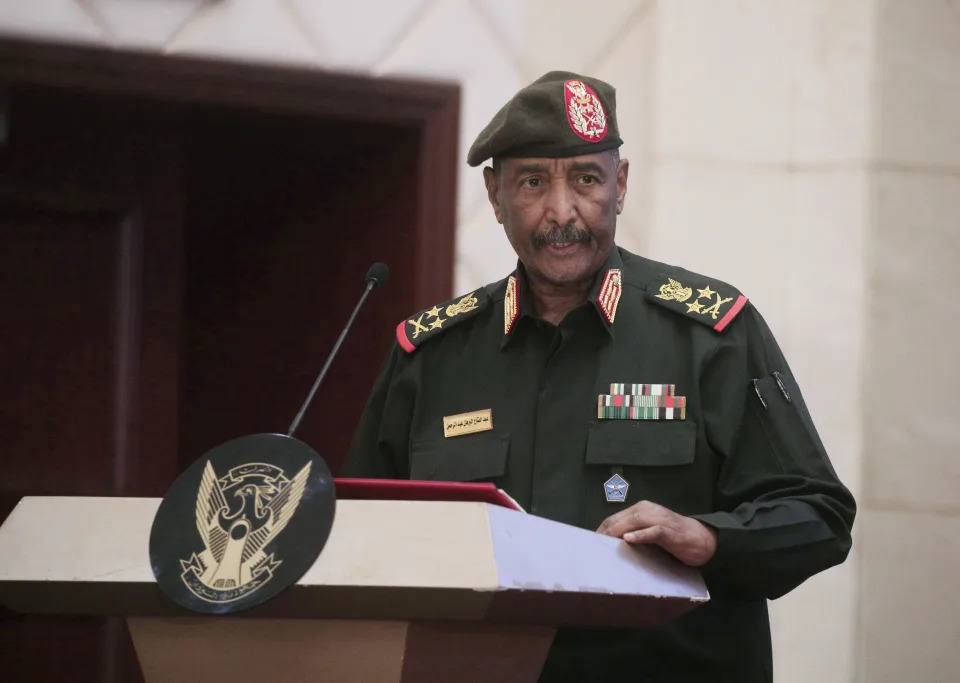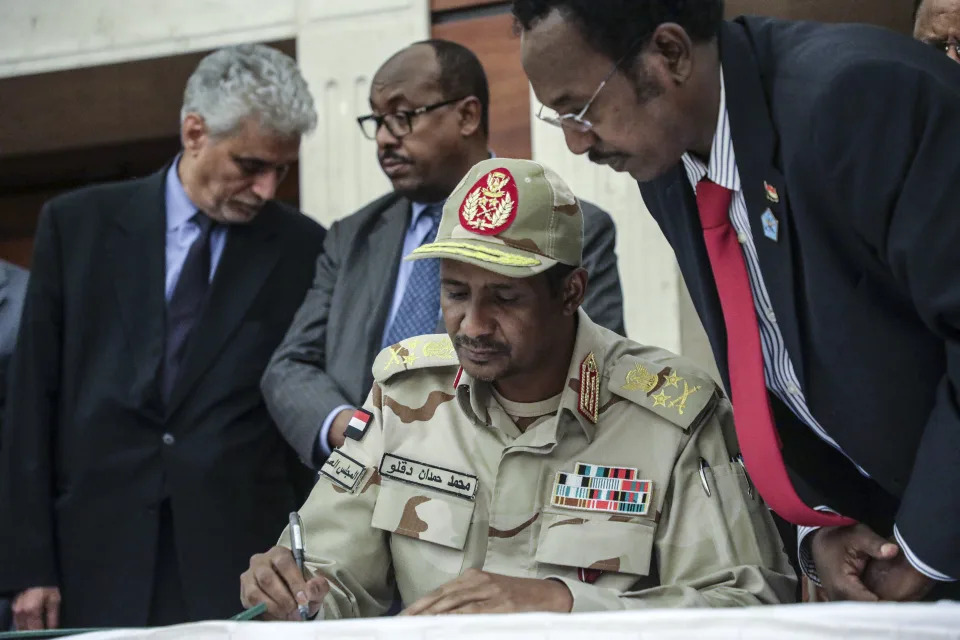Sudan’s generals agree to meet in effort to end their devastating war, a regional bloc says

Sudan’s warring generals agreed to hold a face-to-face meeting as part of efforts to establish a cease-fire and initiate political talks to end the country’s devastating war, an African regional bloc said Sunday. Meanwhile, Sudan's government ordered the expulsion of 15 diplomats from the United Arab Emirates over Abu Dhabi's alleged support of rebel forces.
Sudan slipped into chaos after soaring tensions between military chief Gen. Abdel-Fattah Burhan and Gen. Mohammed Hamdan Dagalo, commander of the paramilitary Rapid Support Forces, exploded into open fighting in mid-April in the capital, Khartoum, and elsewhere across the country.
The country has been in turmoil for several years, ever since a popular uprising forced the removal of longtime dictator Omar al-Bashir in 2019. The short-lived transition to democracy was derailed when the two generals joined forces to lead a military coup in October 2021. After they fell out, war followed 18 months later.
The conflict has wrecked the country and killed up to 9,000 people as of October, according to the United Nations. However, activists and doctors’ groups say the real toll is far higher.
In a meeting of the leaders of the Inter-Governmental Authority on Development, a grouping of East African countries, both Sudanese generals agreed to “an unconditional cease-fire and resolution of the conflict through political dialogue,” and to hold a “a one-to-one meeting,” the bloc said in a statement Sunday.
Burhan, who chairs Sudan’s ruling Sovereign Council, attended the meeting Saturday in Djibouti, which holds the rotating IGAD presidency.
Dagalo, whose whereabouts are unknown, spoke by phone with IGAD leaders.
The statement gave no further details, including when and where the two generals would meet.
However, Alexis Mohamed, an adviser to Djibouti's president, said Sunday on X, formerly known as Twitter, that the Sudanese generals “accepted the principle of meeting within 15 days in order to pave the way for a series of confidence-building measures” that would eventually lead to political talks on ending the conflict in Sudan.
There was no immediate comment from either the Sudanese military or the RSF.
The administration of U.S. President Joe Biden welcomed the generals' commitment to a cease-fire and a face-to-face meeting and called for them to “abide by these commitments and enter talks without delay,” said Matthew Miller, spokesperson for the State Department.
IGAD is part of mediation efforts to end the conflict, along with Saudi Arabia and the United States which facilitated rounds of indirect talks between the warring parties as recently as early November.
Meanwhile Sunday, the state-run SUNA news agency reported the expulsion of the Emirati diplomats, citing the Foreign Ministry. It said the Emiratis had been told 15 diplomats had been declared persona non grata and been ordered to leave Sudan within 48 hours.
There was no immediate acknowledgment from the UAE government. A request for comment to the Emirati Foreign Ministry was not immediately answered.
The UAE has hosted both Burhan and Dagalo for talks. However, media reports have alleged that the Emirates supplied arms to Dagalo's forces in the conflict as part of a way to protect the country's business interests in Sudan, including in agriculture and a Red Sea port. The Emirati government at the time denied arming the rebels.
When the war began, fighting initially centered in Khartoum but quickly spread to other areas, including the western region of Darfur.
More than 6 million people were forced out of their homes, including 1.2 million who have sought refuge in neighboring countries, according to the U.N. figures.
In Darfur, which was the site of a genocidal campaign in the early 2000s, the conflict has morphed into ethnic violence, with the RSF and allied Arab militias attacking ethnic African groups, according to rights groups and the U.N.
The U.S. State Department said earlier this month that the RSF and the Sudanese military were responsible for either war crimes or crimes against humanity, or both, in Darfur.
African mediators claim progress in efforts to end Sudan's war.
A general view of refugee tents in the Metche Sudanese refugee camp, Chad.
An African regional body involved in efforts to mediate over the war in Sudan says it has secured a commitment from warring parties to implement a ceasefire and to hold a political dialogue aimed at resolving the conflict.
There was no immediate comment from Sudan's army or the paramilitary Rapid Support Forces (RSF), which has been locked since mid-April in a conflict that has devastated the capital Khartoum and triggered waves of ethnic killings in Darfur despite several diplomatic efforts to halt the fighting.
Eyewitnesses reported blasts at the major Al-Jaili oil refinery on the outskirts of Khartoum on Sunday, while both sides said there had been casualties when a Red Cross convoy came under fire in the capital.
At talks on Saturday in Djibouti, the current chair of the Intergovernmental Authority on Development (IGAD), Sudan's army chief Abdel Fattah al-Burhan, agreed to a one-on-one meeting with RSF commander Mohamed Hamdan Dagalo, an IGAD statement said.
In a phone call, Dagalo, widely known as Hemedti, also agreed to the ceasefire proposal and a meeting with Burhan, the statement said.
Both Hemedti and Burhan had "accepted the principle of meeting within 15 days in order to pave the way for a series of confidence-building measures between the two parties that lead to the launch of a political process," said Alexis Mohammed, adviser to Djibouti's president.
Earlier, in an address the Djibouti meeting, Burhan accused the RSF of "barbaric attacks" but said the army had not closed the door on finding a peaceful solution.
Hemedti, whose whereabouts are unknown, addressed the IGAD meeting remotely, blaming the outbreak of the war on loyalists of former president Omar al-Bashir who are powerful within the army. He called for reform of the army and the formation of a civilian government.
The war between the army and the RSF erupted over an internationally backed plan to merge the paramilitary force into the army and launch a transition towards elections.
The army and the RSF had shared power after Bashir was toppled during a popular uprising in 2019. Before they came to blows, they jointly staged a coup in 2021 that upended efforts to steer Sudan towards democracy.
On Friday, the United States said it had formally determined that both sides in the conflict had committed war crimes.
In response, the RSF issued a statement on Sunday denying that it had carried out ethnic cleansing in Darfur or was responsible for sexual violence. The army has also denied committing war crimes.
Indirect talks between the army and the RSF brokered by Saudi Arabia and the United States that have stumbled several times faltered again last week as both sides pressed on with their military campaigns.
- Questions and Answers
- Opinion
- Story/Motivational/Inspiring
- Technology
- Art
- Causes
- Crafts
- Dance
- Drinks
- Film/Movie
- Fitness
- Food
- Games
- Gardening
- Health
- Home
- Literature
- Music
- Networking
- Other
- Party
- Religion
- Shopping
- Sports
- Theater
- Wellness
- News
- Culture
- War machines and policy




